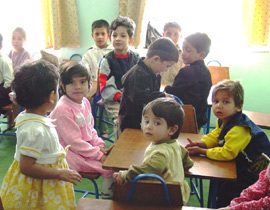Education in Afghanistan
Education in Afghanistan has been one of the country's major challenges due to decades of war, political instability, and economic hardships. The education system in Afghanistan is overseen by the Ministry of Education and the Ministry of Higher Education, which are responsible for implementing educational policies, curricula, and standards across the country.
History[edit | edit source]
The history of Education in Afghanistan dates back to ancient times when education was imparted through traditional methods, including religious schools known as Madrasas. However, the formal education system has undergone significant changes over the years, especially during the 20th century when efforts were made to modernize education. The Soviet invasion in 1979 and subsequent conflicts severely disrupted the education system, leading to a decline in educational facilities and access.
Current Situation[edit | edit source]
In recent years, there has been a concerted effort to rebuild the education sector in Afghanistan. Despite these efforts, the country still faces numerous challenges, including a lack of infrastructure, trained teachers, and educational materials. Gender disparity remains a significant issue, with many girls being denied access to education due to cultural norms and security concerns.
Primary and Secondary Education[edit | edit source]
Primary education in Afghanistan is compulsory and lasts for six years, followed by secondary education, which is divided into two three-year phases. The curriculum includes subjects such as Dari or Pashto language, mathematics, science, social studies, and Islamic studies. However, the quality of education and access to schools varies greatly across different regions.
Higher Education[edit | edit source]
The Higher education in Afghanistan has seen growth in the number of institutions, including universities and colleges. The Kabul University is one of the oldest and most prestigious institutions in the country. Other notable institutions include Herat University, Kandahar University, and Balkh University. However, higher education faces challenges such as a lack of resources, qualified faculty, and research facilities.
Challenges[edit | edit source]
The education system in Afghanistan faces numerous challenges, including:
- Security concerns that prevent students and teachers from attending school safely.
- Cultural and societal norms that hinder girls' education.
- Insufficient funding and resources for education.
- A lack of trained and qualified teachers.
- Inadequate infrastructure and educational materials.
Future Prospects[edit | edit source]
Improving education in Afghanistan requires a multi-faceted approach that includes increasing funding for education, improving security, promoting gender equality, and enhancing the quality of teaching and learning materials. International support and collaboration are also crucial in rebuilding and advancing the education system.
Search WikiMD
Ad.Tired of being Overweight? Try W8MD's physician weight loss program.
Semaglutide (Ozempic / Wegovy and Tirzepatide (Mounjaro / Zepbound) available.
Advertise on WikiMD
|
WikiMD's Wellness Encyclopedia |
| Let Food Be Thy Medicine Medicine Thy Food - Hippocrates |
Translate this page: - East Asian
中文,
日本,
한국어,
South Asian
हिन्दी,
தமிழ்,
తెలుగు,
Urdu,
ಕನ್ನಡ,
Southeast Asian
Indonesian,
Vietnamese,
Thai,
မြန်မာဘာသာ,
বাংলা
European
español,
Deutsch,
français,
Greek,
português do Brasil,
polski,
română,
русский,
Nederlands,
norsk,
svenska,
suomi,
Italian
Middle Eastern & African
عربى,
Turkish,
Persian,
Hebrew,
Afrikaans,
isiZulu,
Kiswahili,
Other
Bulgarian,
Hungarian,
Czech,
Swedish,
മലയാളം,
मराठी,
ਪੰਜਾਬੀ,
ગુજરાતી,
Portuguese,
Ukrainian
Medical Disclaimer: WikiMD is not a substitute for professional medical advice. The information on WikiMD is provided as an information resource only, may be incorrect, outdated or misleading, and is not to be used or relied on for any diagnostic or treatment purposes. Please consult your health care provider before making any healthcare decisions or for guidance about a specific medical condition. WikiMD expressly disclaims responsibility, and shall have no liability, for any damages, loss, injury, or liability whatsoever suffered as a result of your reliance on the information contained in this site. By visiting this site you agree to the foregoing terms and conditions, which may from time to time be changed or supplemented by WikiMD. If you do not agree to the foregoing terms and conditions, you should not enter or use this site. See full disclaimer.
Credits:Most images are courtesy of Wikimedia commons, and templates, categories Wikipedia, licensed under CC BY SA or similar.
Contributors: Prab R. Tumpati, MD






